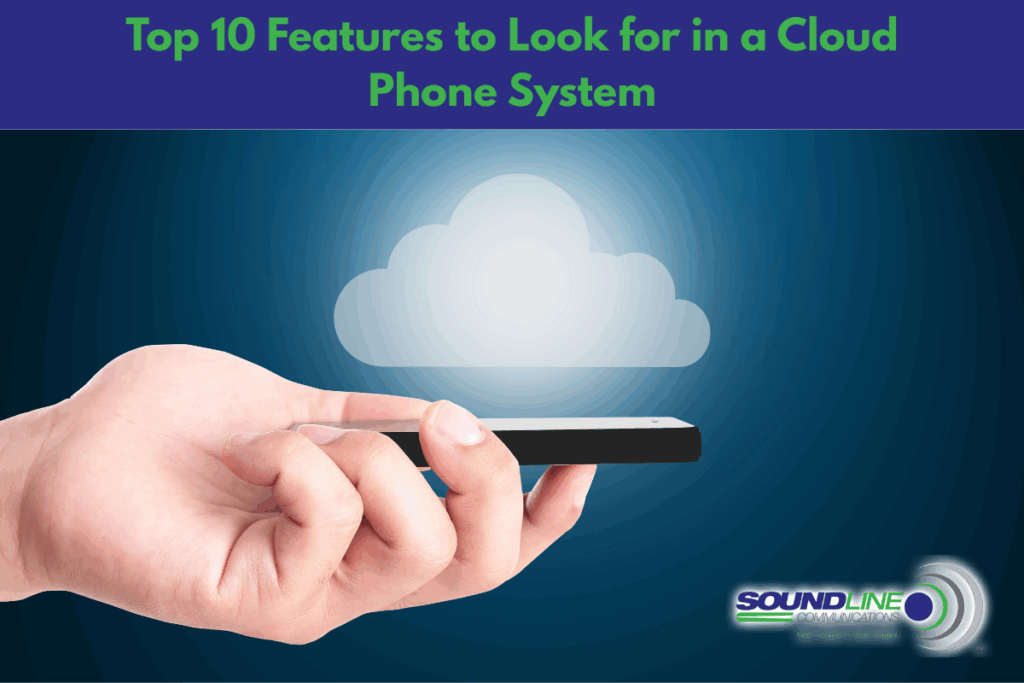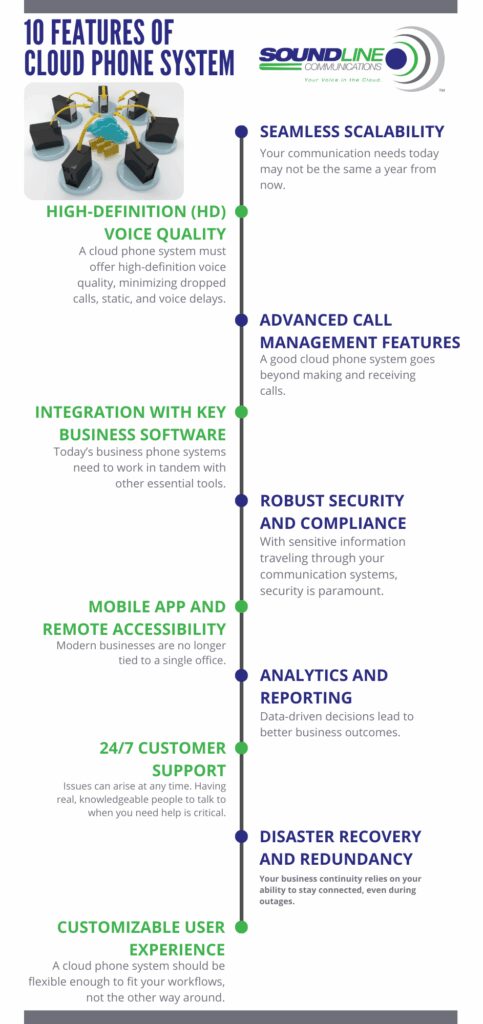Top 10 Features to Look for in a Cloud Phone System

Choosing a cloud phone system is a major decision for any business. Reliable communication, ease of management, and the flexibility to grow are all on the line. But not all systems are created equal. Finding the right solution can transform operations, while a poor choice can disrupt critical workflows.
At Soundline Communications, we believe in providing the best service and the best customer support—real people you can talk to, ready to help your business succeed. In this guide, we’ll walk you through the top features you should demand when evaluating a cloud phone system.

Seamless Scalability
Your communication needs today may not be the same a year from now. A cloud phone system should make scaling up (or down) easy without massive costs or technical headaches.
Look for:
- Instant provisioning of new lines and numbers
- No hardware dependencies
- Flexible pricing that adjusts with usage
Scalability ensures your system grows alongside your business without friction.
High-Definition (HD) Voice Quality
Clear communication is non-negotiable. A cloud phone system must offer high-definition voice quality, minimizing dropped calls, static, and voice delays.
Ensure your provider offers:
- Advanced codecs like Opus for voice clarity
- Consistent quality even during high traffic periods
- Redundant routing for call reliability
Exceptional call quality means fewer misunderstandings and a more professional impression with customers.
Advanced Call Management Features
A good cloud phone system goes beyond making and receiving calls. It should streamline how calls are managed, tracked, and handled across teams.
Critical call management features include:
- Call forwarding and routing
- Auto-attendant (IVR) systems
- Voicemail-to-email transcription
- Call recording and monitoring
- Ring groups and call queues
With intelligent call handling, businesses can ensure that no call is ever missed or mishandled, enhancing customer service at every touchpoint.
Integration with Key Business Software
Today’s business phone systems need to work in tandem with other essential tools. Look for systems that offer native or seamless integration with your CRM, ticketing systems, and collaboration tools.
Examples include:
- Salesforce, HubSpot, and Zoho CRM integrations
- Microsoft Teams and Google Workspace compatibility
- Medical Software Integration Service for healthcare sectors
Integrated systems improve efficiency, reduce data entry errors, and ensure that every customer interaction is logged accurately.
Learn more about our Medical Software Integration Service.
Robust Security and Compliance
With sensitive information traveling through your communication systems, security is paramount. Choose a cloud phone system that prioritizes protecting your data and meeting regulatory requirements.
Key security measures:
- End-to-end encryption for voice and messaging
- Secure access controls and multi-factor authentication (MFA)
- Compliance with HIPAA, GDPR, and industry-specific standards
A secure phone system protects not just your business but also your customers’ trust.
Mobile App and Remote Accessibility
Modern businesses are no longer tied to a single office. Your cloud phone system must enable your team to communicate from anywhere without compromising performance.
Look for:
- iOS and Android mobile apps
- Desktop softphone options
- Secure remote access for off-site employees
Mobility ensures productivity whether your team is in the office, working from home, or traveling.
Analytics and Reporting
Data-driven decisions lead to better business outcomes. Your cloud phone system should provide detailed call analytics and reporting tools.
Essential metrics include:
- Call volume and duration
- Peak call times
- Missed call rates
- Agent performance metrics
Comprehensive reporting enables you to optimize customer service, staff more efficiently, and identify growth opportunities.
24/7 Customer Support
Issues can arise at any time. Having real, knowledgeable people to talk to when you need help is critical.
Prioritize providers that offer:
- 24/7 live support (not just chatbots)
- U.S.-based customer service teams
- Rapid response and resolution times
At Soundline Communications, our reputation is built on real people providing real help—no matter when you need it.
Disaster Recovery and Redundancy
Your business continuity relies on your ability to stay connected, even during outages. A reputable cloud phone provider will offer built-in disaster recovery and redundancy.
Look for:
- Automatic failover to backup servers
- Geo-redundant data centers
- Call forwarding to mobile devices during disruptions
This ensures that operations continue seamlessly, even in the face of unforeseen challenges.
Customizable User Experience
Every business is unique. A cloud phone system should be flexible enough to fit your workflows, not the other way around.
Customization options should include:
- Tailored call flows
- Personalized voicemail greetings
- Custom on-hold music and messaging
A tailored system enhances both internal user satisfaction and the external customer experience.
Conclusion: Choose the Right Cloud Phone System for Your Business
Finding the right cloud phone system is about more than ticking boxes—it’s about empowering your business to communicate reliably, securely, and professionally. With Soundline Communications, you’ll experience best-in-class service, outstanding support from real people, and cutting-edge technology designed with your success in mind.
Ready to elevate your business communications?
Learn more about our cloud phone solutions today.
FAQs
How does a cloud phone system differ from a traditional phone system?
A cloud phone system uses the internet to route calls rather than relying on traditional phone lines. It offers greater flexibility, scalability, and often lower costs.
Is it difficult to switch to a cloud phone system?
Not at all. With expert support from providers like Soundline Communications, the migration is smooth and minimally disruptive.
How secure is a cloud phone system?
Top-tier cloud phone providers employ robust security measures, including encryption, secure data centers, and compliance with regulatory standards, to protect your communications.
